Global Prospects and Policies, Speech by John Lipsky, First Deputy Managing Director, International Monetary Fund
October 28, 2008
International Monetary Fund
At the Securities Industries and Financial Markets Association (SIFMA)
New York, October 28, 2008
| Download the presentation (325 kb PDF) |
I would like to thank Tim Ryan and his SIFMA colleagues for inviting me here today. It is a pleasure and an honor to have the opportunity to address this distinguished audience, and to share the podium with Under Secretary Ryan.
In discussing global prospects and policies this morning, I will focus on two key themes:
- First, to state the obvious, these are very turbulent and uncertain times for the global economy. The world economy is entering a major slowdown, driven by the worst financial crisis in 75 years. As we all know, the current challenges are unprecedented in many important ways. As a result, visibility is unusually imperfect with respect to global economic prospects. Many plausible voices today are predicting dramatic - and, in some cases, dire - outcomes. Regardless, developments continue to evolve rapidly, especially with respect to conditions facing emerging economies. For our part, my IMF colleagues and I are paying close attention to the latest results, and doing our best to anticipate future challenges.
- Second, these very difficult financial and economic circumstances call for timely, decisive and cooperative action. Given the global and systemic nature of the current crisis, policy responses need to be scaled commensurately. Our double mantra is straightforward: Global problems call for global solutions; systemic challenges require a systemic response. Increasingly, policymakers around the world share these basic tenets. Already, many unprecedented measures have been announced, and they need to be implemented quickly. Nonetheless, there is scope for further action-particularly with respect to guarding emerging economies from adverse external developments.
I will begin with a very brief overview of the global outlook.
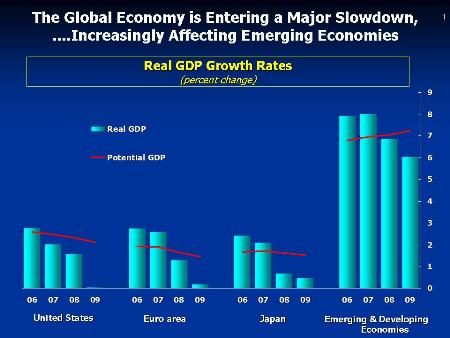
The global economy is in a major slowdown, and there is a risk that it could turn into an outright downturn. Global growth is slowing sharply. Already in this year's first half, growth had slowed to 3½ percent (annualized), down from the 5 percent annual pace sustained over the four previous years.
a. Advanced economies are contracting at end-2008. Advanced economy growth slowed to a standstill during this year's first half. Momentum subsequently has been falling, with leading indicators already dropping to levels last seen during 2001-2002. Indeed, the U.S. economy has slowed sharply and recession risks are looming, while activity in the euro area and Japan had weakened earlier.
b. Increasingly, emerging and developing economies are feeling the impact of the global financial crisis, and their growth is decelerating rapidly. The confluence of a decline in external demand, receding commodities prices, and a sharp moderation in capital flows is likely to dampen activity notably in the coming quarters.
In sum, there is ample justification for pessimism: Global prospects remain highly uncertain and risks of a global recession loom large.
Nonetheless, my IMF colleagues and I are optimistic that a decisive, comprehensive and coherent policy response will be able to truncate the downside risks to the global economy. The key is to focus on dealing with the underlying sources of the weakness, while ameliorating the damage that these underlying factors are creating.
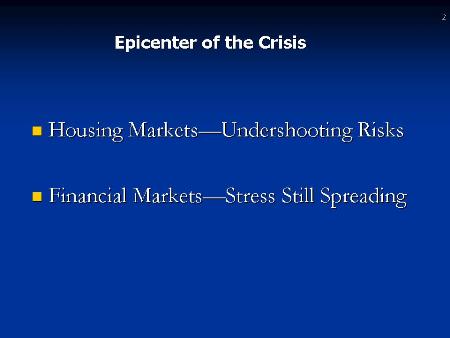
As is widely recognized, the underlying loci of global economic weakness stems from asset price deflation - especially in housing and other real estate markets. Not surprisingly, asset price deflation has been hard on financial markets, creating concentric circles of crisis that have propagated globally at a pace that by and large has taken market participants and policymakers by surprise. How well macroeconomic and financial policies jointly respond to containing the disruption will be telling in determining the global economy's near-term outlook.
There are two key risks to the outlook; One is that asset values - especially housing - will substantially undershoot reasonable long-term levels. The second is that financial market dysfunction will produce reinforcing rounds of real economic distress, especially in emerging economies.
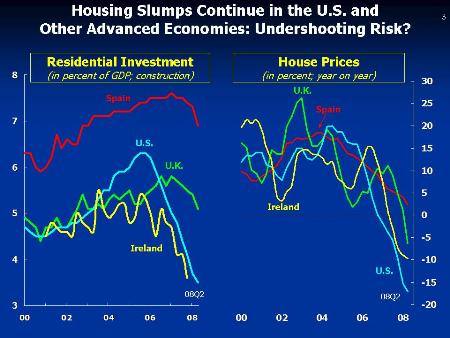
In many countries' housing markets, the apparent boom-time overshooting in valuations already has damaged financial markets and the real economy, but an equally-scaled undershooting would compound the damage.
· Housing-related conditions are weak -- and weakening -- in the United States and several other advanced economies. In the United States, housing activity and prices continue to decline, though the inventory overhang is beginning to moderate. At the same time, however, foreclosures continue to rise, amid a weakening labor market. Rather than finding a floor, as we expect will occur in the coming year, there is a risk of deeper and more prolonged housing correction in the United States. In Europe, the housing correction began later and may have some ways to go. Of course, asset values in many emerging market economies increased in recent years at a faster pace even than in advanced economies, creating obvious risks.
· Avoiding damaging undershooting is justification for a strong policy response. Short-circuiting an adverse feedback loop between housing downturns, widespread financial deleveraging, and weakening confidence would help avoid a deeper downturn. This may require policy actions that impact the underlying markets directly.
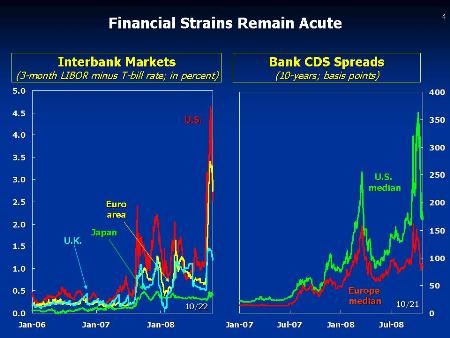
The systemic reach of the global crisis underscores the need for global action on a comprehensive and coherent basis.
In financial markets, notwithstanding bold policy actions announced thus far, conditions remain exceptionally volatile and uncertain. Modest declines in interbank spreads, along with sharp falls in bank CDS spreads, suggest some tentative improvement in market sentiment. Solvency concerns have eased in light of the commitment to use public funds to recapitalize financial institutions, but money market funds continue to face large redemptions.
· And while liquidity strains have eased somewhat, they remain acute. Spreads remain at elevated levels, while exceptional volatility and uncertainty is keeping liquidity preference and risk aversion at elevated levels.
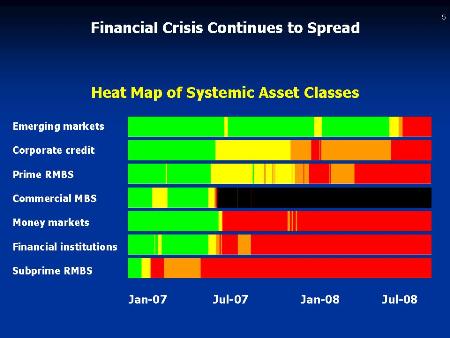
Moreover, the financial crisis has spread rapidly to emerging economies; in effect, we have moved swiftly from talk about "decoupling" to a situation where these economies are at substantial risk.
· As discussed in our latest Global Financial Stability Report, published earlier this month, emerging markets-as an asset class-are coming under increasing strains [shown in orange and red in the chart].
· In particular, intensified financial deleveraging is having a global reach, including to emerging economies. More intense capital account pressures, in turn, could seriously harm growth in these economies.
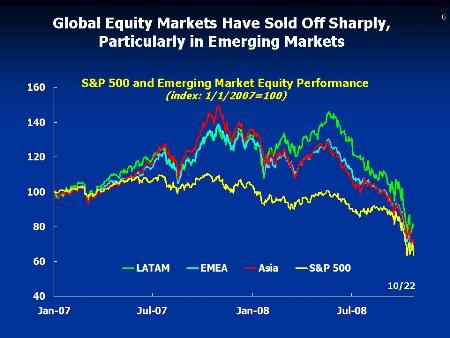
Emerging equity markets already have absorbed greater losses than mature markets, reflecting investors' flight to safety in the face of high uncertainty and risk aversion. Anticipating a significant growth slowdown, emerging equity markets have declined around 50 percent year-to-date.
· Moreover, financial flows are moderating. Pressure on banks in advanced economies-including even those receiving public capital injections and therefore subject to taxpayer oversight-could curtail lending in foreign markets; banks and firms in emerging economies that rely on global wholesale funding markets appear to be facing significant distress and rollover risks; hedge funds and other institutional investors under pressure to unwind positions as a result of tighter financing constraints and redemptions are undermining market liquidity and asset prices more broadly.
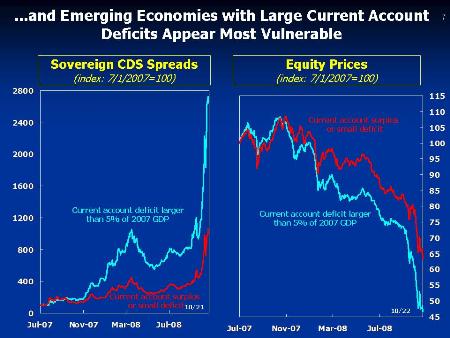
Under current strained global financial conditions, the risk of sudden interruptions (or reversals) in capital flows has risen appreciably.
· Countries with large external financing needs and highly levered financial systems face more intense strains in both credit and equity markets. This underscores their more limited room for maneuver in dealing with spillovers from financial and economic stress in advanced economies. Especially vulnerable in this regard are countries where households have contracted large foreign currency denominated loans.
· For the IMF, the current epidemic of spreading financial market strains reflects a challenge that we have faced many times before in many different guises. What is novel are the scale, scope and complexity of the current difficulties.
Our earlier experience warns that sudden stops in capital flows potentially can transform a liquidity shock into a solvency crisis. The needed remedial action - including helping to minimize the risk of a sudden stop, and/or standing ready to compensate for one - is a key IMF responsibility.
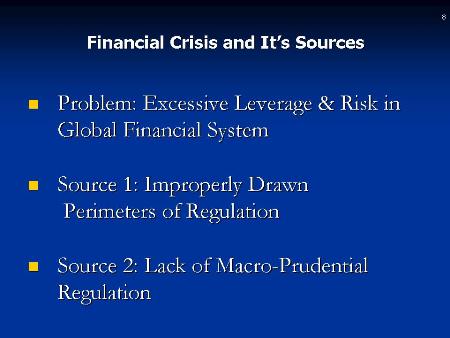
We all know more or less how we got to this point - even if the recognition was clear mainly in hindsight. Simply put, the globalizing financial system built up too much risk and too much leverage.
· At the IMF, we have drawn two broad lessons from this experience: First, it seems evident that what we have labeled the "perimeter of regulatory oversight and risk management" was drawn too narrowly. Thus, risks remained out of sight that should have been front and center. The second broad lesson is that regulation should incorporate macro-prudential considerations. In other words, regulation and supervision have focused on instruments and institutions, while remaining more or less oblivious to cyclical and other macroeconomic considerations
Incorporating both these considerations -- the perimeter of regulation, and macro-prudential aspects - will not be either quick or easy. Nonetheless, they will be steps in the right direction.
The immediate imperative for policies is to restore confidence in the financial system. IMF experience indicates that successful efforts typically incorporate three basic aspects: Preserving short-term liquidity, removing damaged assets from bank balance sheets, and recapitalizing banks.
· In advanced economies, bold financial measures announced earlier this month will need to be implemented effectively and quickly.
o Bank recapitalization should proceed swiftly; central bank liquidity support should continue to be provided generously; and comprehensive approaches should be pursued to deal with distressed assets in the financial sector.
· More broadly, policies need to decisively contain both financial disruptions and the possible growth implications, which will include reliance on traditional macroeconomic tools. With the global slowdown undermining commodity prices, the scope for monetary policy to support economic activity has increased, particularly in advanced economies that until recently have been dealing with containing inflation risks.
o Fiscal measures are being used more comprehensively to address solvency issues in systemically important financial institutions, to purchase distressed assets, and to recapitalize the system. At the same time, further support to aggregate demand may be needed, given the loss of private sector confidence.
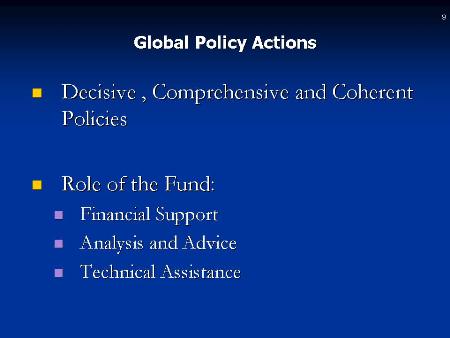
Policy requirements may also require greater multilateral efforts-inclusive of emerging economies.
· The policy measures adopted by advanced economies may impart unintended effects-notably, since financial institutions in emerging economies in general are not covered under the umbrella of the liquidity operations in advanced economies. Also, domestic banks in emerging economies do not necessarily have the same level of protection through deposit guarantees and such measures as public capital injections. Thus, they may feel pressured to put in place their own programs, even where the resources needed to create credible policies of this nature may not be available.
· In emerging economies, policy actions to deal with sudden interruptions (or reversals) of capital flows will be needed. Of course, in many cases the improvement in monetary, fiscal and structural policies in recent years represents a important protection, as has the build-up in international reserves. Nonetheless, these may not offer complete protection.
o Liquidity support needs to include the corporate sector in countries where funding markets are shrinking. Countries with large reserve buffers could provide foreign currency liquidity as needed, if acute dollar shortages of is affecting firms' ability to operate.
o Emerging economies may also need to consider traditional macroeconomic policies to deal with a shortfall in financing and growth.
The Fund, for its part, is moving quickly and playing an active role to help emerging economies battered by the financial crisis and by the sharp slowdown in advanced economies
· The Fund stands ready to disburse more than $200 billion of loanable funds and can draw on additional resources through standing borrowing arrangements with groups of IMF member countries. As you know, we are currently in program negotiations with several members.
· Since halting economic and financial crises requires timely measures, the Fund is actively considering the launch of a new short-term liquidity lending facility to address problems of fundamentally sound countries temporarily exposed to funding pressures.
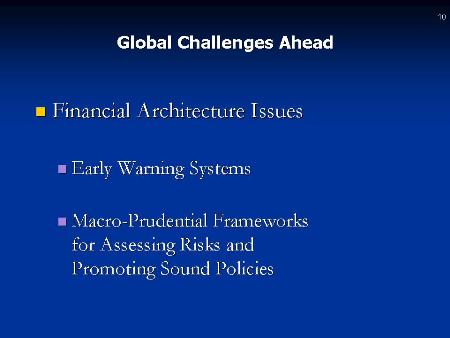
Looking past the immediate challenges, a concerted effort will be needed to build a more resilient and efficient financial system. In addition to the two broad areas I mentioned already, there is a need to strengthen global early warning systems, in order to mitigate future risks.
In conclusion, these are very uncertain times and the risks to the global economy are large. But taking a comprehensive and collaborative approach globally-across the full range of policy instruments that we have at our disposal, I am confident that the worst can (and will) be avoided and that a more resilient and sounder financial system will eventually emerge. But the hard work lies just before us, and all will need to do our part.
IMF EXTERNAL RELATIONS DEPARTMENT
| Public Affairs | Media Relations | |||
|---|---|---|---|---|
| E-mail: | publicaffairs@imf.org | E-mail: | media@imf.org | |
| Fax: | 202-623-6220 | Phone: | 202-623-7100 | |


